In this edition of court judgements review, we look at the Supreme Court’s judgements on fraud accounts classification by banks, pensionary benefits to contractual employees, and validity of notification of central government, Andhra Pradesh High Court’s decision on abetment to suicide, Bombay High Court’s decision on applicability of domestic violence act on transgenders, and Jammu and Kashmir and Ladakh High Court’s decision on section 504 IPC/intentional insult.
Supreme Court: Opportunity of hearing must be granted to the borrowers before classifying their accounts as frauds.
In State Bank of India & Ors. vs. Rajesh Agarwal & Ors., the Supreme Court held that since classifying accounts as frauds has serious ramifications on borrowers, such directions classifying the accounts as frauds must be construed reasonably, and it is necessary to incorporate principles of natural justice, in particular, the rule of ‘audi alteram partem’ to prevent the Master Directions on Frauds from the vice of arbitrariness.
The Apex Court bench headed by Chief Justice of India DY Chandrachud and Justice Hima Kohli was hearing appeals against the Reserve Bank of India (Frauds classification and Reporting by Commercial Banks and Select FIs) Directions 2016. The Telangana High Court held that principles of natural justice ought to be looked into the provisions of the Master Directions on Frauds. This judgement is being challenged.
The counsels for the borrowers argue that no notice was given to the borrowing firm or its promoters, directors, including whole-time directors, or promoters under Clauses 8.9.4 and 8.9.5. Severe civil repercussions take place as outlined in Section 8.12 of the Master Directions on Frauds. Additionally, the banks’ classification of an account as “fraud” is stigmatic, damaging their right to reputation, thus affecting their fundamental rights.
The counsel for RBI argued that RBI is properly authorised to take preventative actions in the public interest and under the Master Directions, the process for labelling an account as fraudulent is not arbitrary. Depriving fraudulent borrowers of bank financing is a preventive measure without which the Master Directions on Frauds will lose all of their teeth. As a result, these directions must be interpreted in light of their purpose and objective, which is prompt detection, information sharing, and reporting about fraud.
Upon hearing both sides and looking at the Master Directions on Frauds, the apex court held that the right of the borrowers to be heard prior to taking action to classify their accounts as frauds is not specifically excluded by the Master Directions on Frauds. Where a statute or notification is silent on giving a party a chance whose rights and interests are likely to be impacted by the decisions that may be made, the principles of natural justice can be interpreted to apply as enumerated in Mangilal vs. State of Madhya Pradesh and Swadeshi Cotton Mills vs. Union of India.
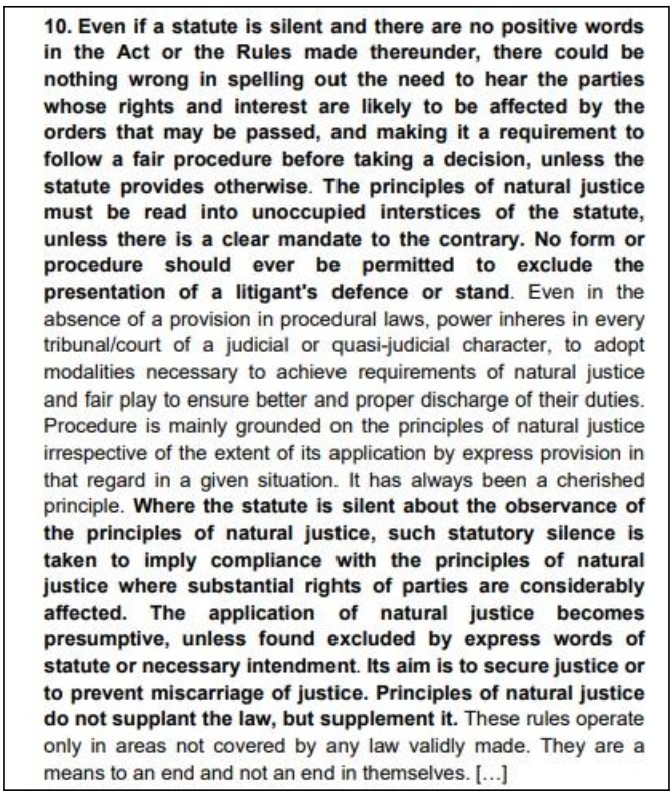
Further, the rule of audi alteram partem has to be read into the provisions of the said directions to save them from the vice of arbitrariness. Further, the court held that the requirement of reasoned order must also be read into the Master Directions on Frauds, as a reasoned order gives the aggrieved party the chance to demonstrate that the reasons the authority used to deliver a judgement against their interests were irrelevant or perverse, and it also serves as a check on the exercise of authority arbitrarily. It is not necessary to elevate the reasons to be recorded to the same status as a judicial decision. The justifications may be concise, but they must be fair by showing a proper application of thought.
Accordingly, the judgement of the Telangana High Court dated 10 December 2020 is upheld & civil appeals are disposed.
Supreme Court: Service rendered as casual/contractual cannot be said to be service rendered on a substantive appointment – Can’t be counted towards qualifying services for pensionary benefits under Rule 13 of the Central Civil Services (Pension) Rules, 1972
The Supreme Court, in Director General, Doordarshan Prasar Bharti Corporation of India & Anr vs. Smt. Magi H Desai held that service rendered as casual/contractual is not a substantive one, and cannot be counted as temporary service for the purpose of calculating the qualifying service for pensionary/retiral benefits.
The two-judge bench comprising Justice MR Shah and Justice CT Ravi Kumar were hearing an appeal filed by the Director General, Doordarshan Prasar Bharti Corporation of India challenging the judgement of the Gujarat High Court which directed that the petitioners’ contractual service period should be counted for calculating the service for pension benefits.
In 1985, the original applicant was hired on a contract-or-casual basis to work as a general assistant. The respondent’s contract-based/occasional services as general assistant were then periodically extended, although with breaks of a few days. The services of the original applicant were later regularised as Lower Division Clerk with effect from 31.03.1995 in accordance with the Scheme of Regularisation of Casual Staff Artists of Doordarshan, 1992/94, following the decision of the Principal Bench of the Central Administrative Tribunal, New Delhi, to regularise casual employees by way of framing of Scheme. The original applicant asked the Tribunal to take her prior service into consideration, but she was turned down. The Gujarat High Court heard an appeal, allowing the applicant to submit a representation to the department. The department too rejected the application, which was again challenged in the High Court, which eventually rendered to consider the temporary service period for the calculation of pension benefits.
Upon hearing both sides, the apex court held that the High Court misinterpreted Rule 13 to consider the temporary service period for pensionary benefits. Rule 13 of the Central Civil Services (Pension) Rules, 1972 is as follows.
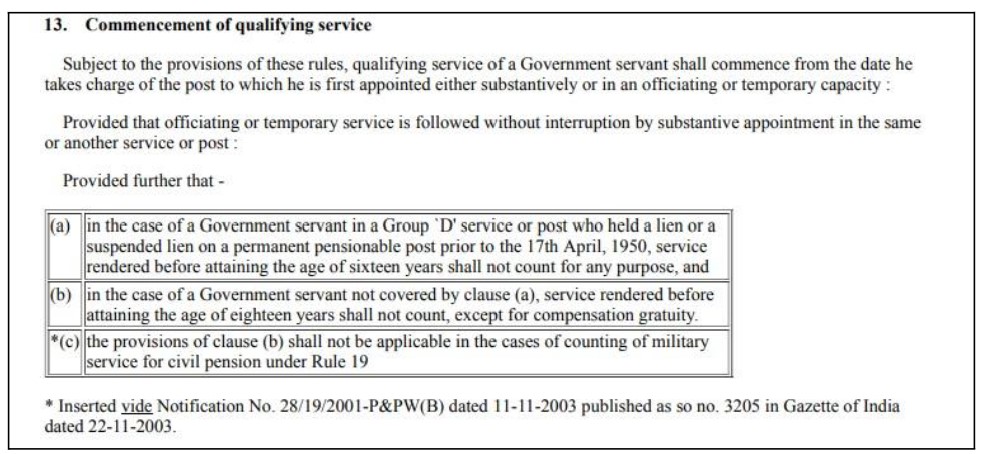
Further, upon fair reading and interpretation of Rule 13, the High Court committed a serious error by observing that the services in temporary capacity will include the classes of temporary service such as casual or even contractual.
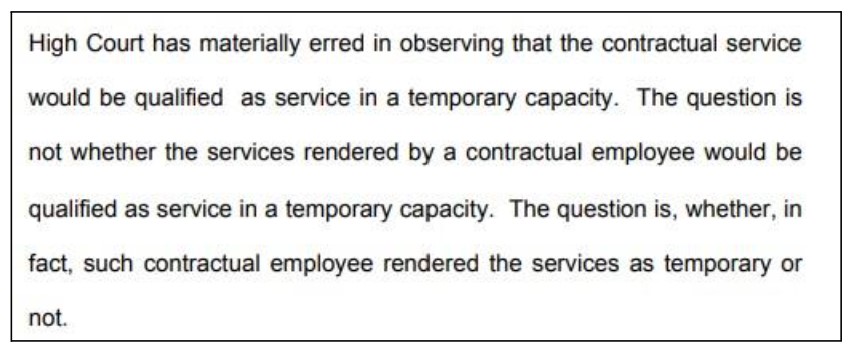
Additionally, merely because employees in other departments under the scheme were entitled to their services rendered as casual/contractual counted for the qualifying service for pensionary benefits, this does not provide for the same benefit to be availed by the applicant, particularly in the absence of any specific scheme in her department, and it must be kept in mind that Doordarshan Prasar Bharti Corporation of India is an autonomous independent department/body.
Accordingly, the Judgement of the Gujarat High Court is quashed and set aside.
Supreme Court: Merely because it is not issued in President’s name, a notification issued by the Union Government cannot be held invalid.
In Orissa Administrative Tribunal Bar Association vs. Union of India & others, the apex court, headed by the Chief Justice of India DY Chandrachud and Justice Hima Kohli, held that a notification issued by Central Government is not invalid merely because it’s not issued in the President’s name, thereby dismissing the petitions filed by the Odisha Administrative Tribunal Bar Association against the Odisha High Court’s decision that upheld the abolition of Odisha Administrative Tribunal.
These petitions pertained to the abolition of the Odisha Administrative Tribunal (OAT). Article 323A empowers Parliament to provide for the adjudication of certain disputes by administrative tribunals and Article 323B empowers the state governments to provide for the adjudication of certain disputes. Following the establishment of the Administrative Tribunals Act (ATA), 1985, the Central Government periodically established tribunals based on the requests from the states. The Central Government established the OAT on 4 July 1986. Consequent to the judgement in L. Chandra Kumar vs. Union of India, the state of Odisha requested to abolish the OAT, which was later notified under the ATA, 1985. This was challenged in the Odisha High Court. The High Court held that Article 323A is an enabling provision, making it not mandatory for the Union Government to establish or refrain from abolishing the tribunals.
The appellants, along with other submissions, argued that the notification dated 2 August 2019 by which the OAT was abolished is invalid because it is not expressed in the name of the President of India in terms of Article 77 of the Constitution.
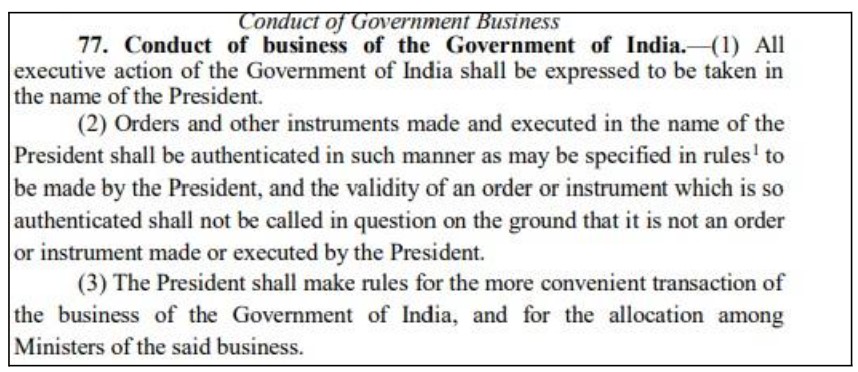
Article 77 is a directory provision. Article 77(1) discusses the format in which the executive’s decision must be presented. This is clear from the word “expressed to be taken” in Article 77’s clause (1). It is irrelevant to the decision-making procedure itself. Declaring an order that is not issued in the President’s name to be void would have negative repercussions, with the public or the populace standing to lose the most.
The Apex court held that the failure to comply with Article 77’s clause (1) does not render a notice invalid, unconstitutional, or non-est. Instead, the Union Government is no longer entitled to the unassailable inference that the notification was issued by the President of India (acting on behalf of the Union Government). The notification is still in effect, and the Union Government is free to substantiate that the order was in fact given by the proper authority.
Further, the court also held that the notification establishing the OAT was also not done in President’s name. The court found inconsistency in arguments seeking to preserve the OAT on one hand and challenge the notification abolishing OAT on the other hand.
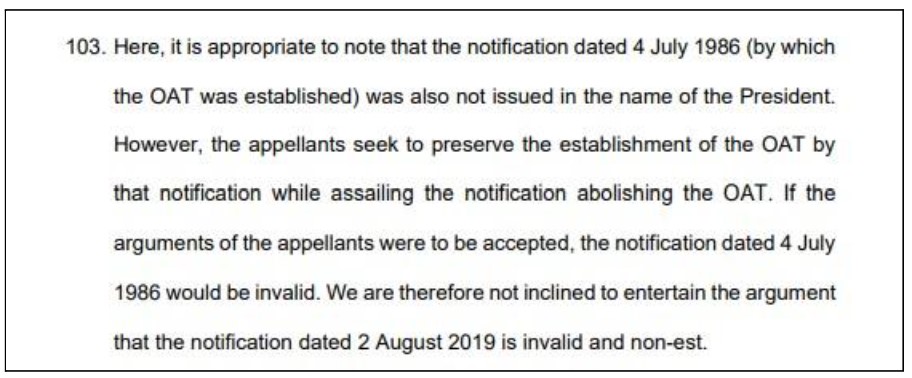
Accordingly, this argument is not accepted, and Odisha High Court’s judgement is upheld.
Andhra Pradesh HC: Allegation of general harassment do not fall under the interpretation of ‘abetment’ of suicide.
An abetment to suicide case under Section 306 of the IPC, in Gadipudi Anitha vs. State of Andhra Pradesh, was dismissed by the Andhra Pradesh High Court on the grounds that the offence would not be committed by just alleging harassment without the accused’s knowing encouragement of the deceased to take their own life.
The deceased allegedly committed suicide in August 2016 by writing a suicide note that listed a number of creditors she said had been pestering her for money back. The note made it clear that the intolerable harassment she was subjected to from these creditors was the cause of her suicide. The petitioners, a married couple, were also particularly mentioned in the same suicide note. The question of whether the petitioners herein had abetted her in the commission of her suicide is the issue before this Court.
The Court upon hearing the arguments from both sides, relied on the apex court’s judgement in C.B.I vs. V.C. Shukla, where it is held that.

Apart from the fact that the deceased mentioned the harassment in her suicide note, there are no facts or information regarding the alleged harassment. In these cases, the petitioners are only accused of general harassment in an effort to reclaim their money. Such harassment would not fall under Clauses 1 and 2 of the definition of “Abetment” given above. Clause 3 calls for the petitioners to have intended to persuade the victim to commit the crime. There is no claim that the petitioners engaged in any behaviour with the goal to motivate the dead woman to commit suicide.
Accordingly, the allegations in the charge sheet do not make a case for abetment of suicide and hence the case is quashed.
Bombay HC: A person who has exercised his right to decide the self-identified gender of women is an aggrieved person within the meaning of Section 2(a) of the Domestic Violence Act, 2005
In Vithal Manik Khatri vs. Sagar Sanjay Kamble @ Sakhi Vithal Khatri & Anr, the Bombay High Court held that a transgender woman who has undergone sex reassignment surgery can be considered as an “aggrieved person” under the Domestic Violence Act, 2005.
The bench headed by Justice Amit Borkar was hearing a petition against the judgement of the Judicial Magistrate and Additional Sessions Judge which awarded interim maintenance under the Protection of Women from Domestic Violence Act, 2005. The petitioner married a transgender woman who underwent sex reassignment surgery. The contentions of the petitioner is that respondent does not fall under the category of ‘aggrieved person’ and the respondent does not have a certificate under Section 7 of the Transgender Persons (Protection of Rights) Act, 2019.
Upon hearing both sides, the court held that,
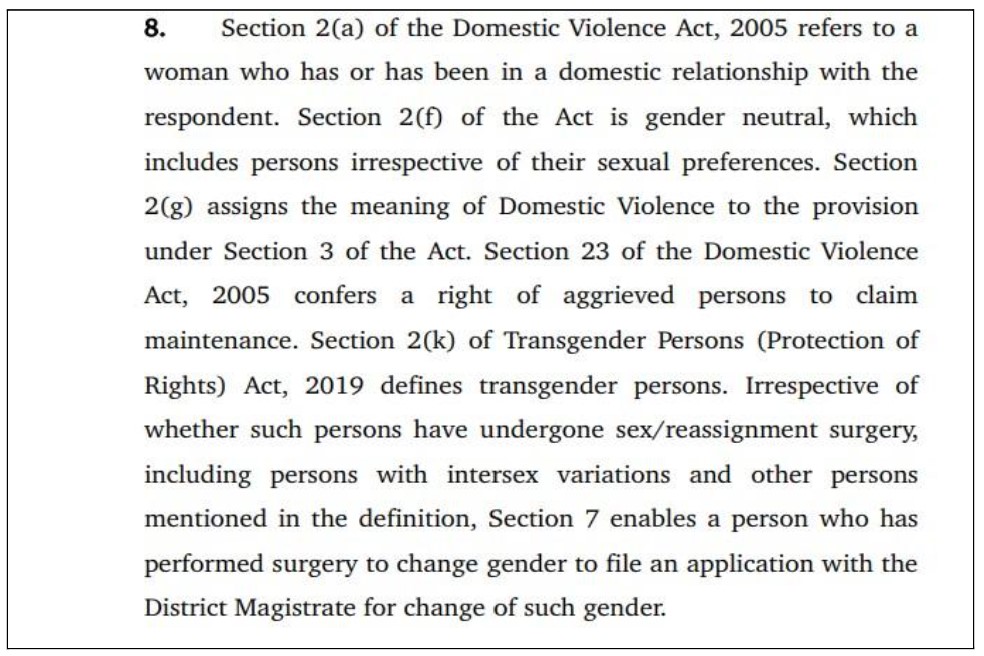
The High Court further relied on the judgement of the apex court in National Legal Services Authority vs. Union of India and Others, where the transgender persons’ right to decide their self-identified gender is also upheld. Further,

Accordingly, the writ petition is dismissed.
Jammu and Kashmir and Ladakh HC: Mere act of insulting a person would not satisfy the ingredients of section 504 IPC.
In Jia Lal vs. UT of J&K & Anr, the Jammu and Kashmir and Ladakh High Court held that a simple act of insulting someone would not meet the requirements of section 504 of the Indian Penal Code (Intentional insult with intent to provoke breach of the peace). Instead, an insult must be of a kind that would provoke the person being insulted to violate the peace or to commit another crime, in order to attract the offence.
A single-judge bench headed by Justice Sanjay Dhar was hearing a plea, which is still being heard by the Court of Judicial Magistrate 1st Class, that contested the allegations made in the complaint that they had committed crimes under sections 504 and 506(1) of the IPC. The question that arose for determination after considering the case’s facts was whether a person’s simple claim that she has been threatened or that vulgar language has been used against her would be sufficient to establish that the accused has committed offences under sections 504 and 506(1) IPC. Section 504 of the IPC is as follows.

The court relied on the judgement of the apex court in Fiona Shrikhande vs. State of Maharashtra and another, where it was held that in order to meet the requirements of Section 504 IPC, the prosecution must demonstrate that the accused wilfully insulted the complainant in order to provoke him, intending or knowing that such provocation would lead him to violate any other law or breach the public peace. It is obvious that an intended insult must be severe enough to cause someone to disrupt the peace or commit another crime.
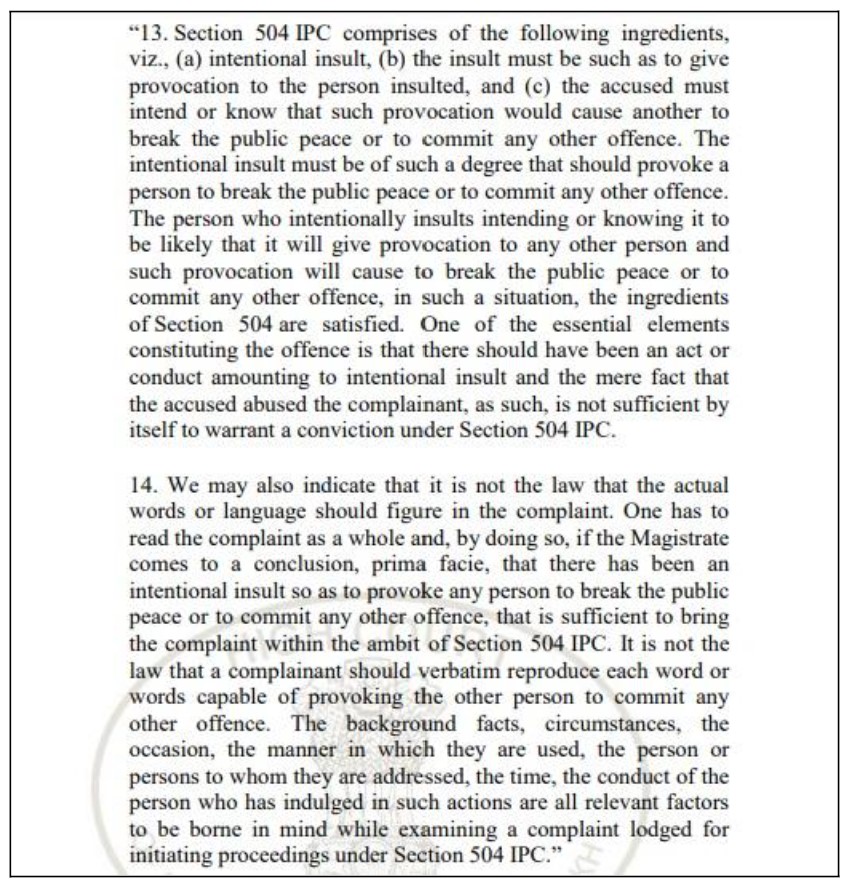
Further, on the applicability of Section 503 and 506 of IPC regarding Criminal Intimidation, it is obvious that in order to meet the requirements for the crime of criminal intimidation, there must be a threat by the accused of harm to the complainant’s person, reputation, or property. This threat must be made with the intent to alarm the complainant or persuade him to take any action for which he is not legally responsible or to omit acting in order to avoid carrying out the threat. Criminal intimidation is not defined by the mere statement of any words without any aim to frighten the complainant or to force him to perform or refrain from performing any act.
In this case, the material on record and the allegations do not make out offences under sections 504 and 506(1) RPC. Accordingly, the petition is allowed and the complaint as well as the proceedings emanating therefrom, are quashed.
Featured Image: Court judgements


